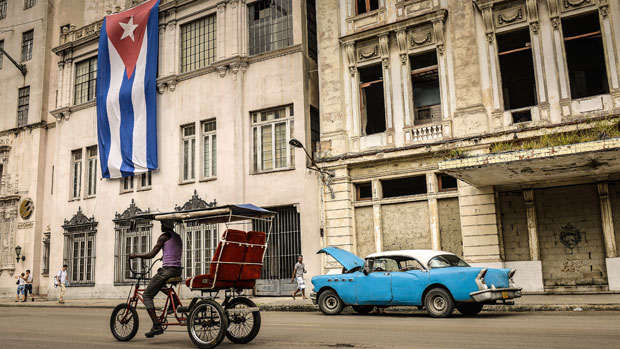US government created 'Cuban Twitter' to undermine regime
American aid agency funded ZunZuneo messaging service to encourage dissent in Cuba

A free daily email with the biggest news stories of the day – and the best features from TheWeek.com
You are now subscribed
Your newsletter sign-up was successful
THE US government has confirmed that it was behind a Twitter-type text message service in Cuba allegedly intended to foment unrest and destabilise the government, but it has denied that the programme was covert.
The service, named ZunZuneo, lasted from 2009 to 2012 and at its peak had more than 40,000 users.
An Associated Press report says that the service was funded by the US Agency for International Development (USAid) using front companies in Spain and the Cayman Islands to hide the money trail.
The Week
Escape your echo chamber. Get the facts behind the news, plus analysis from multiple perspectives.

Sign up for The Week's Free Newsletters
From our morning news briefing to a weekly Good News Newsletter, get the best of The Week delivered directly to your inbox.
From our morning news briefing to a weekly Good News Newsletter, get the best of The Week delivered directly to your inbox.
White House spokesman Jay Carney confirmed that the US government was behind ZunZuneo but denied that the programme was secret: "This was not an intelligence programme, this was an effort to promote the flow of free information... especially in societies that are non-permissive – because we believe that that is part of the essential right of every individual on earth."
ZunZuneo, a colloquial name for a hummingbird's tweet, initially tried to attract users by creating discussions around topics such as sport and weather. US officials then planned to introduce political messages criticising the communist government.
Users of the service were unaware that a US government agency was behind the service, nor that US contractors were gathering information about them. Washington-based agency Creative Associates International collected mobile phone numbers of half a million Cubans, through the service.
The US senator who governs USAid, Patrick Leahy, said he was not informed of the programme, and found the whole project troubling. "On the face of it there are several aspects about this that are troubling. There is the risk to young, unsuspecting Cuban cellphone users who had no idea this was a US government-funded activity (and) there is the clandestine nature of the programme that was not disclosed to the appropriations subcommittee with oversight responsibility."
A free daily email with the biggest news stories of the day – and the best features from TheWeek.com
USAid spokesman Matt Herrick told the BBC that the agency was "proud of its efforts in Cuba" emphasising that the organisation aimed to connect people who had little free access to information from the outside world.
One contractor told The Guardian that there was an "inherent contradiction" in giving Cubans access to "free" information that was not sponsored by their government, but was financed by the US.
The service wound down and closed in 2012.
-
 6 exquisite homes with vast acreage
6 exquisite homes with vast acreageFeature Featuring an off-the-grid contemporary home in New Mexico and lakefront farmhouse in Massachusetts
-
 Film reviews: ‘Wuthering Heights,’ ‘Good Luck, Have Fun, Don’t Die,’ and ‘Sirat’
Film reviews: ‘Wuthering Heights,’ ‘Good Luck, Have Fun, Don’t Die,’ and ‘Sirat’Feature An inconvenient love torments a would-be couple, a gonzo time traveler seeks to save humanity from AI, and a father’s desperate search goes deeply sideways
-
 Political cartoons for February 16
Political cartoons for February 16Cartoons Monday’s political cartoons include President's Day, a valentine from the Epstein files, and more
-
 Trump’s fuel blockade puts Cuba in crisis mode
Trump’s fuel blockade puts Cuba in crisis modeIN THE SPOTLIGHT Plummeting tourism, scrambling airlines and rolling blackouts are pushing Cuban society to the brink
-
 Epstein files topple law CEO, roil UK government
Epstein files topple law CEO, roil UK governmentSpeed Read Peter Mandelson, Britain’s former ambassador to the US, is caught up in the scandal
-
 Iran and US prepare to meet after skirmishes
Iran and US prepare to meet after skirmishesSpeed Read The incident comes amid heightened tensions in the Middle East
-
 Grok in the crosshairs as EU launches deepfake porn probe
Grok in the crosshairs as EU launches deepfake porn probeIN THE SPOTLIGHT The European Union has officially begun investigating Elon Musk’s proprietary AI, as regulators zero in on Grok’s porn problem and its impact continent-wide
-
 Israel retrieves final hostage’s body from Gaza
Israel retrieves final hostage’s body from GazaSpeed Read The 24-year-old police officer was killed during the initial Hamas attack
-
 China’s Xi targets top general in growing purge
China’s Xi targets top general in growing purgeSpeed Read Zhang Youxia is being investigated over ‘grave violations’ of the law
-
 Panama and Canada are negotiating over a crucial copper mine
Panama and Canada are negotiating over a crucial copper mineIn the Spotlight Panama is set to make a final decision on the mine this summer
-
 Why Greenland’s natural resources are nearly impossible to mine
Why Greenland’s natural resources are nearly impossible to mineThe Explainer The country’s natural landscape makes the task extremely difficult